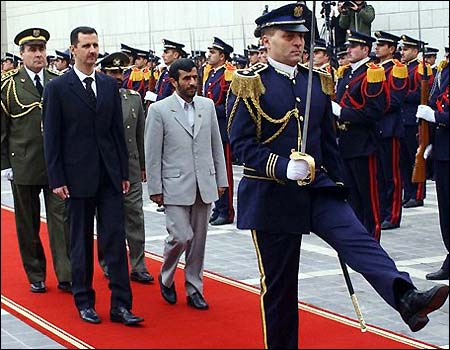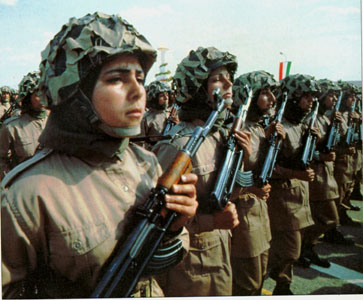Re: Consequences Of Attacking Iran And Why Tehran Is Not Worried

The IDF is becoming big, rich and dumb
Firepower versus brainpower
Two weeks after Israel set out to defeat Hezbollah, its military achievements are pretty limited. A country that stood up to seven Arab nations in the War of Independence, a war of the "few against the many," with an army that pulverized the invading forces of three Arab nations in the span of six days, is now facing an embarrassing role reversal: a war of the "many against the few" in which Israel is on the floorboards.
Who would have believed that a guerrilla organization with a few hundred regular fighters, something like a brigade and a half, could paralyze half a country, firing off hundreds of missiles every day? A total of 2,200 by Sunday morning, says the defense minister. Who would have believed that cities like Safed, Acre, Nahariya, Tiberias and especially Haifa, the capital of the North, would wake up every morning to the sound of sirens and deadly rocket fire that would turn tens of thousands of people into refugees and shut down life in a large part of the country?
And that's even before Hezbollah has tried to use its long-range missiles on Tel Aviv. Who would have believed that the Israel Defense Forces, the army that is prepared for large-scale wars, that Iran fears will attack its nuclear facilities, that can drop 23 tons of bombs in a single night, is incapable of stopping Hezbollah's missile fire? How is that as soon as the IDF announces Hezbollah's TV station has been bombed, Hassan Nasrallah pops up in blooming health to continue his taunts against us?
Israel went to war with the goal of wiping out Hezbollah, a hostile militia operating on its border, in response to provocation and the kidnapping of soldiers made possible by the sluggishness and routine that has become widespread in the IDF in recent months. It did so with international backing, with President Bush leading the pack, and the support of most Israeli citizens. Bush and the public assumed that the army knew what it was doing, and that Israel, with its superiority in manpower, weaponry and technology, would be able to put an end to Hezbollah as a menace to Israel. Little by little, however, a worrying picture has begun to emerge: Instead of an army that is small but smart, we are catching glimpses of an army that is big, rich and dumb.
Take the bizarre appearances of IDF top brass on television: The commander of the Home Front, who stands there handing out high marks to the Israeli public, seemingly unaware that the moment people sense the army is not functioning, they will take to their heels - not only leaving their homes but fleeing the country, following tens of thousands of tourists who have already hightailed it out of here. The chief of staff, who had to say that "we're going to turn Lebanon back into what it was 20 years ago," and now threatens to blow up a 10-floor building for every missile. The district commander who declares: "We don't do body counts in the middle of a war," an improved version of the comment of Benny Gantz, who was a brigadier general in 2001:
"When you chop down trees, splinters fly," totally forgetting that the splinters are human beings. We have a chief of staff who looks like he gets up every morning and agonizes over what to wear - his blue uniform or his khakis. A chief of staff who delivers state-of-the-union addresses that should be the job of the prime minister, and spends whole days touring with Channel 2 correspondent Ronny Daniel. In his observations to the media, Brigadier General (res.) Rafi Noy is right when he says that Hezbollah, with its hidden arsenals, continues to enjoy the upper hand, while the mighty IDF still has far to go to knock it out of commission.
Unlike some of my colleagues, I believe that Israel is fighting a no-choice war that we must do everything possible to win. Air strikes, ground operations - whatever it takes so that Hezbollah, exhausted and beaten, pulls back and a multinational force is deployed along the international border together with the Lebanese Army, in keeping with Security Council Resolution 1559. If Hezbollah does not cooperate with a UN-mediated agreement stipulating that it give up its heavy weapons, and refuses to stay north of the Litani River, the IDF will have no choice but to keep up the attacks and pound away at Hezbollah, crushing it outpost by outpost. The rules of the game dictated by Hezbollah are going to have to change. A status quo ante is out of the question.
The conflict with Hezbollah cannot be allowed to deteriorate into a war of attrition. It must not be expanded beyond its stated goals. And the Israeli public must not be overly put to the test, lest the "wonderful home front" blow up in the government's face. The trouble is that we don't have all the time in the world. Condeleezza Rice is on her way. She will shuttle back and forth, back and forth, until the moment comes for a cease-fire agreement. We can only hope that the army reverts to its old self and has the wisdom and good sense to know what to do and when to do it, to produce the desired outcome.
Link: http://www.haaretz.com/hasen/spages/742261.html

The IDF is becoming big, rich and dumb
Firepower versus brainpower
Two weeks after Israel set out to defeat Hezbollah, its military achievements are pretty limited. A country that stood up to seven Arab nations in the War of Independence, a war of the "few against the many," with an army that pulverized the invading forces of three Arab nations in the span of six days, is now facing an embarrassing role reversal: a war of the "many against the few" in which Israel is on the floorboards.
Who would have believed that a guerrilla organization with a few hundred regular fighters, something like a brigade and a half, could paralyze half a country, firing off hundreds of missiles every day? A total of 2,200 by Sunday morning, says the defense minister. Who would have believed that cities like Safed, Acre, Nahariya, Tiberias and especially Haifa, the capital of the North, would wake up every morning to the sound of sirens and deadly rocket fire that would turn tens of thousands of people into refugees and shut down life in a large part of the country?
And that's even before Hezbollah has tried to use its long-range missiles on Tel Aviv. Who would have believed that the Israel Defense Forces, the army that is prepared for large-scale wars, that Iran fears will attack its nuclear facilities, that can drop 23 tons of bombs in a single night, is incapable of stopping Hezbollah's missile fire? How is that as soon as the IDF announces Hezbollah's TV station has been bombed, Hassan Nasrallah pops up in blooming health to continue his taunts against us?
Israel went to war with the goal of wiping out Hezbollah, a hostile militia operating on its border, in response to provocation and the kidnapping of soldiers made possible by the sluggishness and routine that has become widespread in the IDF in recent months. It did so with international backing, with President Bush leading the pack, and the support of most Israeli citizens. Bush and the public assumed that the army knew what it was doing, and that Israel, with its superiority in manpower, weaponry and technology, would be able to put an end to Hezbollah as a menace to Israel. Little by little, however, a worrying picture has begun to emerge: Instead of an army that is small but smart, we are catching glimpses of an army that is big, rich and dumb.
Take the bizarre appearances of IDF top brass on television: The commander of the Home Front, who stands there handing out high marks to the Israeli public, seemingly unaware that the moment people sense the army is not functioning, they will take to their heels - not only leaving their homes but fleeing the country, following tens of thousands of tourists who have already hightailed it out of here. The chief of staff, who had to say that "we're going to turn Lebanon back into what it was 20 years ago," and now threatens to blow up a 10-floor building for every missile. The district commander who declares: "We don't do body counts in the middle of a war," an improved version of the comment of Benny Gantz, who was a brigadier general in 2001:
"When you chop down trees, splinters fly," totally forgetting that the splinters are human beings. We have a chief of staff who looks like he gets up every morning and agonizes over what to wear - his blue uniform or his khakis. A chief of staff who delivers state-of-the-union addresses that should be the job of the prime minister, and spends whole days touring with Channel 2 correspondent Ronny Daniel. In his observations to the media, Brigadier General (res.) Rafi Noy is right when he says that Hezbollah, with its hidden arsenals, continues to enjoy the upper hand, while the mighty IDF still has far to go to knock it out of commission.
Unlike some of my colleagues, I believe that Israel is fighting a no-choice war that we must do everything possible to win. Air strikes, ground operations - whatever it takes so that Hezbollah, exhausted and beaten, pulls back and a multinational force is deployed along the international border together with the Lebanese Army, in keeping with Security Council Resolution 1559. If Hezbollah does not cooperate with a UN-mediated agreement stipulating that it give up its heavy weapons, and refuses to stay north of the Litani River, the IDF will have no choice but to keep up the attacks and pound away at Hezbollah, crushing it outpost by outpost. The rules of the game dictated by Hezbollah are going to have to change. A status quo ante is out of the question.
The conflict with Hezbollah cannot be allowed to deteriorate into a war of attrition. It must not be expanded beyond its stated goals. And the Israeli public must not be overly put to the test, lest the "wonderful home front" blow up in the government's face. The trouble is that we don't have all the time in the world. Condeleezza Rice is on her way. She will shuttle back and forth, back and forth, until the moment comes for a cease-fire agreement. We can only hope that the army reverts to its old self and has the wisdom and good sense to know what to do and when to do it, to produce the desired outcome.
Link: http://www.haaretz.com/hasen/spages/742261.html

















Comment